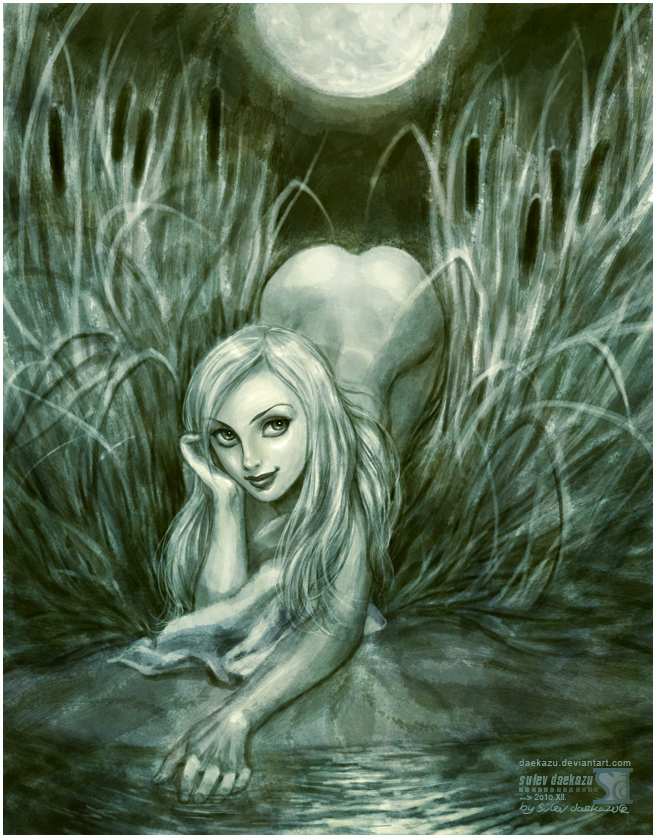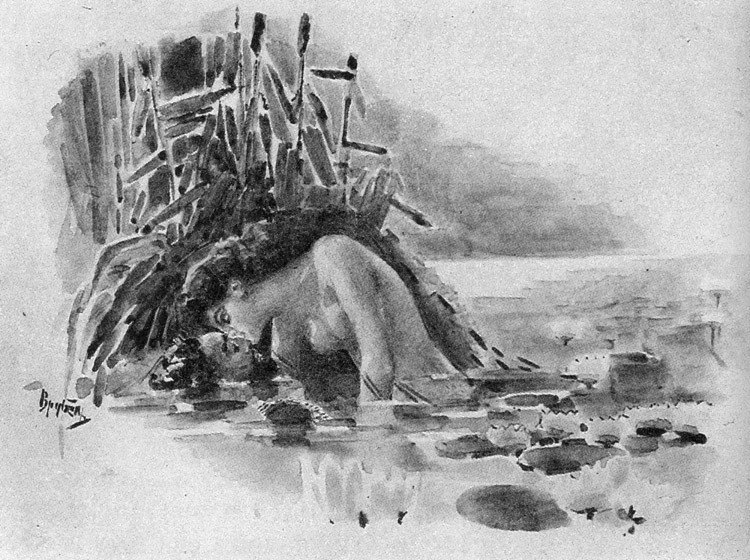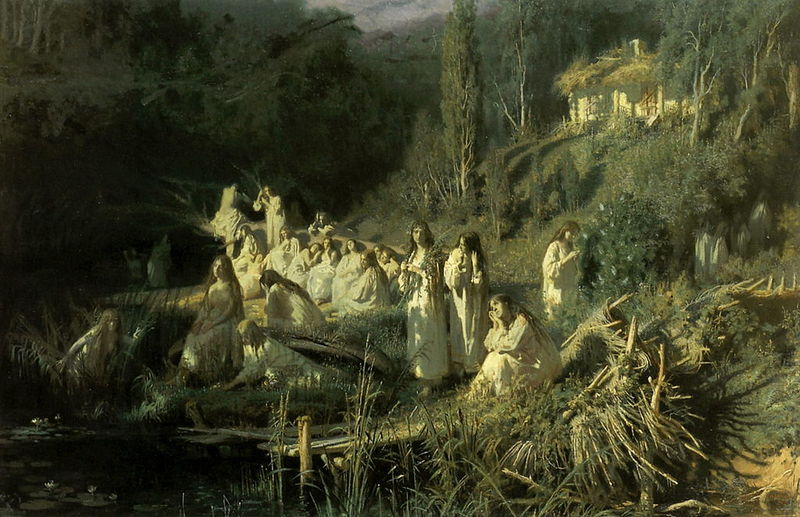Saturday, September 21, 2024
Russian Folktales:The Two Corpses 🧟🧟♂️
Monday, December 11, 2023
Drakavac
Drekavac
It's name means the screamer" or "the screecher, as it's name would suggest its known for its distinctive and often terrifying scream.
The Drekavac is most often encountered at night, especially during the twelve days of Christmas (called unbaptized days ) and in early spring, when other demons appear most often.
It takes the form of the child, though deformed with elongated limbs and sometimes fur.
In other story's (especially more modern tellings) it usually resembles a dog like creature. However it can also assume other forms as well like a dappled foal, dog, cat, or bird or even a human like being with glowing eyes. Other visions of the cryptid are described as a dog like beast that walks on its back legs, a long legged long necked animal with a cats head or an undead vampire like man that wonders the cemetery similar to a ghoul.
Originally believed to have come from the soul of a corrupt or sinful man, or from children who died unbaptized
When seen in it's human form it looks like a child, and predicts someone's death while in its animal form, it predicts cattle disease.
The Drekavac ether dislikes or fears dogs and is believed to avoid dogs and bright light.
There is also a common belief that if the shadow of drekavac falls on someone then that person will become sick and eventually die.
In some regions it could be considered a type of boogyman, used to scare kid's into behaving, in a similar way a the Boogeyman is in other places.
It's also used as a scare tactic to keep smaller children from wandering to far from home.
......
Other cryptids or monsters similar to a drakavac..
- Bukavac – recorded in Syrmia, a six-legged monster with gnarled horns, slimy skin and long tail, that lives in water (rivers, swamps and creeks) and comes out of it during the night. It is known that it makes loud noises, and it will try to strangle people and animals that it encounters;
- 👹👻🧛♀️
- Jaud (pronounced [jaud]) – a vampirised premature baby.
- 🧛♀️
- Myling – from Scandinavian folklore, a phantasmal incarnations of the souls of unbaptized children that had been forced to roam the earth.
- 👻
- Nav – the soul of dead child that died before its third age.
- 👻
- Plakavac – recorded in Herzegovina, is a newborn strangled by its mother, which will rise from its grave at night as small vampire-like creature, return to its house and scream around it, but otherwise can't do any harm.
- 🧟👻
- Poroniec – a hostile and malicious demon from Slavic mythology. They were believed to come into existence from stillborn fetuses, but also from improperly buried remains of children who had died during infancy.
👹
Wednesday, June 2, 2021
Monsters, cryptids and yokai: The Rusalka..

Rusalka by daekazu on deviantart https://www.deviantart.com/daekazu/art/Rusalka-187551820
===================
==============
=========
The Russian Mermaid ...
She is as dangerous as she is beautiful
Rusalka or Pusalka is commonly described as a water nymph..
The Rusalka is a female spirit in Russian / Slavic folklore and their equivalent of a mermaid. though she has two leg's insted of a finned tail and in some versions can walk on land and even climb tree's..
She has different names in various cultures: rusalka (in East Slavic cultures) vila (Czech, Slovak), wiła (Polish).
According to most accounts the rusalki were a type of fish-women, who lived at the bottom of rivers and lake's.
In some legends she would leave her watery home late at night together with other Rusalki she would walk out to the bank and dance in meadows. If they saw handsome men, they would enchant them with songs and dancing, mesmerize them, then lead them away to the river and to their inevitable death.

Art by Anna Vinogradova Kransndar 1975
=========================
A Rusalka most often appears as a beautiful young women, she will site by the shore of a lake usually coming her hair or sometimes singing this is done as a means to lure in her prey..
In some version's she is a type of water spirit in other's she is a young woman that was ether murdered by her lover of who committed suicide by drowning due to an unhappy marriage or who were violently drowned against their will (especially after becoming pregnant with unwanted children), and now must live out their time on Earth as rusalki.
However,in some Slavic versions not all rusalki encounters were linked with death from water It is accounted by most stories that the soul of a young woman who had died in or near a river or a lake would come back to haunt that waterway.
Though this version of a rusalka is not invariably malevolent or evil, and would be allowed to rest in peace if her death is avenged.
========
In some versions she has green sea week like hair....
================
Her main purpose is, however, to lure young men, seduced by either her looks or her voice, (Similar to a Siren or a Succubus) into the depths of the waterways where she would entangle their feet with her long hair and submerge them. Her body would instantly become very slippery and not allow the victim to cling on to her in order to reach the surface.

======
She would then wait until the victim had drowned, or, on some occasions, tickle them to death, as she laughed.
It is also believed, by a few accounts, that rusalki can change their appearance to match the tastes of men they are about to seduce although a rusalka is generally considered to represent universal beauty, therefore is highly feared yet respected in Slavic culture.
===================

Ivan Kramskoi, The Mermaids, 1871
======
In some of the older stories the Rusalka was a symbol of fertility and not consider evil in the old pagan beliefes
They came out of the water in the spring to transfer life-giving moisture to the fields and thus helped nurture the crops.
=====
=======================
Celebrations: Rusalka Week..
=======================
The Rusalki are believed to be at their most dangerous during the Rusalka Week in early June. At this time, they were supposed to have left their watery depths in order to swing on branches of birch and willow trees by night. Swimming during this week was strictly forbidden, lest these mermaids would drag a swimmer down to the river bed.

Rusalka by Ivan Bilibin - 1934
===========================================
A common feature of the celebration of Rusalnaya was the ritual banishment or burial of the rusalki at the end of the week, which remained as entertainment in Russia, Belarus, and Ukraine until the 1930s
=====
Other mediums ..
============
The Rusalka trilogy of novels by C. J. Cherryh feature and revolve around a rusalka named Eveshka.
Rusalka is an opera by Alexander Dargomyzhsky. - 1856
"Rusalka" is a poem by Mikhail Lermontoy 1831.
Nikolai Medtner's Third Piano Concerto is based on Mikhail Lermontov's ballad.
A Rusalkas is the main character in "The Surface Breaks", a YA novel and retelling of Hans Christian Andersen's "The Little Mermaid" by Louise O'Neill.
Rusalkas appear as monsters in the Action Role playing game The Incredible Adventures of Van Helsing.
"The Last Wish " by Andrzej Sapkowski, a Polish novel from the Witcher series, in which Geralt briefly encounters a Rusalka that has fallen in love with a cursed man.
"Fatima Rusalka", a single by alternative metal band Alesana ..
There are many many other examples of Rusalka in modern media bedside's the one's i mentioned here.. :)
.================
===============
==============




